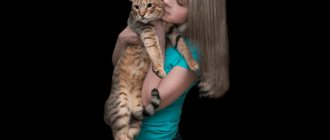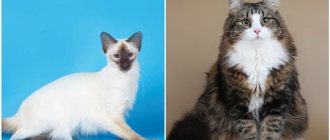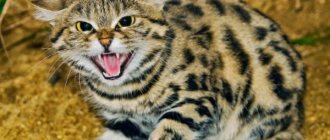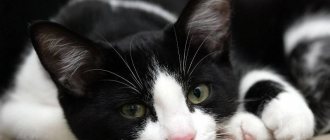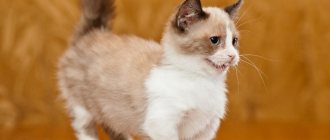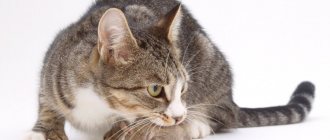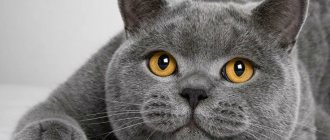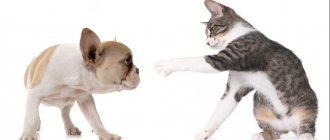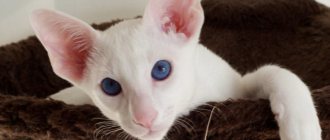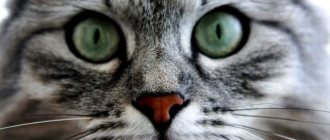The Savannah cat is a breed that is a cross between ordinary domestic cats and their wild relatives. Their appearance resembles a serval, but at the same time they have an affectionate nature. The popularity of this breed is just beginning to gain momentum. This is evidenced by a threefold increase in demand for them in the period from 2021 to 2019.
Origin story
The first experiments on crossing African wild servals with Siamese cats began in 1986.
This happened on a farm in Pennsylvania (USA). A breeder named Judy Frank, who had extensive experience in breeding work, namely in breeding bush cats. To introduce fresh blood and new genes, she used a neighbor's serval. But he managed, along with the females of his species, to also mate with a domestic cat that lived with this breeder. The owner of these kittens was the owner of the male, Susie Woods.
She gave the name Savannah, which later became the name of the breed itself. Susie had no knowledge or experience in breeding work, but this did not stop her from engaging in further experiments of crossing domestic cats with wild ones. She even published several articles on this topic in felinology journals.
A great contribution to the formation and spread of the breed was made by Patrick Kelly, who purchased several kittens from Susie and crossed them with the Bengal cat breed. In 1996, Kelly and Sroufe presented a new breed of cheetah at the international exhibition, which had an unusual color, similar to a cheetah, only in miniature. These same experts formulated the standards for this breed.
Question to the expert
In what year did the Savannah breed officially appear?
In 2001, the Savannah cat breed received official recognition from major organizations, and Sroufe himself became widely known among breeders and breeders as the founder of an elite cat family.
Description and character of the Savannah cat
The legendary Savannah cat can be bought in professional nurseries. Savannah is actively discussed on cat breeder forums; on social networks, they become “bloggers” and gain thousands of subscribers and likes. However, most people do not know what kind of cat this is or what it is like. What kind of cat is this and how did it appear?
People have long been not only afraid of wild cats, but also admired them. The dream of seeing an independent wild cat submissive to humans haunted many, so the Savannah cat appeared as a result of crossing a wild serval with a domestic cat.
Savannah is not a simple cat breed, it is a hybrid of a wild serval and a domestic cat. Felinology knows many stories of crossbreeding between wild and domestic cats. These include the famous Bengal cats, Chausie cats, and some native cat breeds. Such crossings are not so easy to carry out, because kittens born from such love may have an unstable psyche. A wild animal will always be careful around people. Compared to domestic cats, wild cats are timid and cowardly in front of humans. Therefore, hybrid kittens from wild cats can be both cowardly and, sometimes, aggressive. Solving this problem, felinologists found that the success of crossing a serval and a domestic cat depends on the genetic material of the serval. In order for the resulting hybrid to have all the makings of a domestic cat, the parent serval should not be innately afraid of people. For a serval, this is a behavioral deviation in the wild. Any owner of a tamed serval is familiar with the term “neophobia” - a panicky fear of everything new. What it is? Well, for example, you rarely see a domestic cat that will rush around in a panic, jump on a closet or hide under the bed when it sees a bouquet of flowers being brought into the apartment.
When a Serval is born under human control, socialized from an early age and raised correctly, he will be the best choice for breeding hybrid kittens. In this regard, if you decide to buy a Savannah cat, do it in a professional cattery. Only a professional breeder of hybrid cats selects pairs of sires taking into account these features of breeding hybrid cats. It is very important to obtain Savannah kittens that are tolerant of humans and have controlled behavior.
Externally, Savannah cats, especially their first generations F1 and F2, are very similar to servals. Large “signature ears”, a voluminous nose, lanky paws, a long body and a short tail are favorably emphasized by the bright yellow-orange fur with black spots.
Savannah character
This is a very unusual cat with a unique temperament, intelligence and personality. Despite only 50% or less (depending on the generation) of wild serval blood, the hybrid retains the appearance of a serval while combining it with the docile nature of a domestic cat. The balanced combination of intelligence, wild beauty and physical potential of the serval with the sweet qualities of the domestic cat created a truly unique creature. Savannah is suitable for people who want to have a strong, smart, loyal cat and who have time to raise and communicate with the Savannah.
Unlike other cat breeds, the Savannah cat has unique qualities. For example, they have more developed intelligence. Hybrids are the leaders in intelligence among domestic cats. They are highly trainable and can follow commands. It’s not for nothing that the savannah is often compared to a dog.
From their wild ancestors, savannahs inherited an exceptional sense of smell, which is 5–6 times superior to that of a cat and resembles a dog’s. They distinguish the smell of a person and understand that a stranger is approaching them, even if he is many meters away from the savannah. At the same time, from domestic cats they received a love for people. The relationship with the owner of the Savannah is very trusting, but in order to achieve this, a person must be able to show sufficient rigidity (not to be confused with cruelty) and be an indisputable authority for the Savannah. Such a strong beast needs an even stronger owner. Not every person is capable of this.
Savannahs can retain the instincts of a predatory serval, and the danger of the savanna for people lies in possible aggression. The predator instinct may kick in at a certain moment, and the cat may show the aggression typical of wild animals. To avoid this, their breeding should be done by professionals, not only from the point of view of the correct selection of pairs of parents, but also from the point of view of the socialization of these hybrid cats. This requires a fairly subtle professional approach so as not to provoke the development of anthropophobia (fear of people) in them. That’s why it’s so important to buy a Savannah kitten from a professional cattery and follow the breeder’s recommendations.
The conditions for purchasing Savannah kittens are very strict, and the prices are high. Such strict rules are explained by the desire to protect the breed from uncontrolled matings and from kittens getting into the hands of unprepared people. Just the desire to buy a Savannah cat is not enough. Because buying a kitten is, first of all, a responsibility. When a person contacts me with a desire to purchase a kitten, we always discuss his readiness and his capabilities to have a kitten of this particular breed. If in our dialogue it turns out that a person is not ready, for some reason, to buy a Savannah cat, I can offer more suitable options for this person.
Character traits
The genes that these animals have have virtually no effect on the behavior of savannahs. Representatives of this breed are friendly, but it is impossible to call them couch-dwellers. They are also very smart, resourceful, and quick-witted. You should not choose relatives of servals as home decoration. They are very playful animals, with good mobility and curiosity.
They can open the doors of rooms or cabinets, drawers, and climb onto the top shelves. They are characterized by stubbornness and perseverance. Forbidden items become much more interesting for them. If a cat plans something, it will certainly implement its plans.
These cats can tire their owner with their playfulness. For safety reasons, it is better to remove potentially dangerous objects from the apartment, for example, poisonous indoor plants; he will certainly want to try them.
Interesting read: all about munchkins - a short-legged cat breed.
F1 and F2 are not prone to aggression, but it may be unsafe to have them in families with small children. Temper and character are formed before the age of three; it is quite possible that an affectionate kitten will acquire new qualities, sometimes even opposite ones. F3, F4 have a character close to that of a domestic cat. The Savannah cat chooses one person as his friend; he may simply not notice the rest of the family.
They tend to butt the owner's paw, in this way the pet expresses its trust and respect. He can allow himself to be stroked, but only if he has the desire to do so. It is extremely difficult to force her to sit on her lap. To communicate, the savannah uses a wide variety of sounds - from hissing to meowing.
They like to walk on a harness and are easy to train. They are quite capable of being taught to carry out simple commands. The new pet will quickly find a common language with other animals that already live in the house, but will strive to become a leader for them.
Price
The cost of a pet depends on the percentage of Serval in the blood. Savannah F1 is the most expensive because it is very rare. They are very difficult to produce due to the 10-day difference in gestation periods (the average gestation period for domestic breeds is about 63 days, for a Serval it is 74 days). Savannah kittens are born prematurely or the pregnancy is terminated.
Additionally, the closer a female is to the ancestry of her African relative, the larger the kittens she produces but the smaller the litter. The F1 and F2 generations have very small litters (1-3 kittens) once a year, sometimes going through long periods without a birth. That's why they cost more.
Average prices for kittens are shown in the table.
| Generation | Litter size | Pet price |
| F1 | 1-3 | 15 – 30 thousand $ |
| F3 | 1-4 | 6 – 12 thousand $ |
| F3 | 4-6 | 3 – 4 thousand $ |
| Next generations | 4-6 | 1 – 3 thousand $ |
How to care and maintain
When getting a Savannah cat, you should know what its owner will face:
- often walk in the fresh air;
- devote a lot of time to your pet;
- come to terms with broken vases, pots and other items;
Without a scratching post and additional claw care, maintaining a savannah in the house is not possible. It is important to choose these accessories based on the size of your pet. There are also trash cans with tight lids at home. Otherwise, debris will be scattered on the floor.
Wool does not require special care. It needs to be brushed once a week, especially when shedding. In this period of time, this should be done every day. This can be done by simply stroking with a damp cloth; all excess hair will remain on the surface of the material.
There are no problems with toilet issues. For individuals from the F4, F5 generation, you can choose a smaller tray than for individuals closer to their wild relatives. These cats have different sizes. The ideal place to live for them would be a country house. On the site, the animal can throw out all its energy.
Material on the topic: interesting facts about cats.
How to choose a diet
The savannah's menu should be similar to the diet of a wild serval. The best option for nutrition is raw or boiled meat. It is better to choose low-fat varieties, such as rabbit, turkey or veal. It is not recommended to give fish or milk. Only by eating natural food does a cat have a serious risk of experiencing a deficiency of useful and necessary substances.
You will have to use vitamin and mineral supplements or use ready-made industrial food, but from a premium line. Also, you should not give your cat grains or fermented milk products. According to veterinarian statistics, a natural diet can extend life expectancy by 5 years or more.
How to raise a savannah
Savannah kittens acquire the necessary skills for living with humans when they are with a breeder. This breed rarely has problems with education; they quickly understand what is required of them and follow all the rules established by their owner.
Care and maintenance
Those who are planning to get a Savannah kitten must be prepared for long and frequent walks, the independence of the pet, and the inevitable pogroms in the house. To avoid numerous destructions, it is worth removing all breakable, fragile objects: vases, figurines, potted flowers, lamps.
Like Maine Coons, Ashers prefer to spend a lot of time at heights, making an observation platform out of tall furniture or a refrigerator. The best solution for the owner would be to purchase special modular structures through which they can climb up and monitor what is happening at home.
A scratching post will also become a necessary attribute for cats to live in an apartment, and you should choose only large, stable structures. Small and flimsy scratching posts will not last long.
In general, caring for and maintaining a savannah will not cause any particular difficulties for the owner. Cats simply need to be brushed at least once a week. Only during seasonal molting in spring and autumn is it recommended to carry out this procedure daily. Some breeders advise replacing combing with wiping with a regular damp cloth.
The short-haired coat of the animal does not require a visit to the groomer, but the nails must be trimmed monthly. If the cat is not accustomed to the process since childhood, then it is better to trust a specialist, otherwise the haircut will be delayed and lead to disastrous consequences for human hands.
Ears and eyes also require regular inspection and cleaning as needed. Teeth are brushed weekly using a special finger brush. You can use dental treats in the form of bones, sticks or cartilage for this purpose.
Savannah loves to swim in bathtubs or even pools, but she must be washed when she gets dirty, remembering to dry her well. Shampoos and conditioners designed for short-haired cats should be used for bathing. It is important to prevent a wet cat from staying in a draft or in a cold room. Representatives of this breed are very heat-loving, so during the cold season you can take care of your pet’s wardrobe.
Big cats get used to the toilet quickly, but due to their large dimensions it is difficult for them to fit into a standard tray. Therefore, it is advisable to accustom them to using an outdoor toilet or using a toilet.
Breeding
Puberty in cats occurs at approximately 8 months of age, but it is better to start breeding after a year. The cat must have stable hormonal levels and good health so that pregnancy and childbirth go without problems and do not harm the kittens or the mother herself.
Mating and pregnancy
The cat is taken to the male's territory. Animals must be vaccinated and have their claws treated to avoid causing injury to each other. This may take 1-3 days, depending on the behavior of the male.
Pregnancy lasts approximately 9 weeks. A few days before giving birth, your cat's behavior changes. She begins to follow her owner around. It is better for a person to have the veterinarian’s phone number or take the animal to the clinic in advance.
Sterilization of non-breeding individuals
If the owners do not plan to further breed the breed, they should consider sterilizing their pet. It is better to perform this operation at the age of 5-6 months. Otherwise, there may be problems with nervous behavior, unpleasant odor and other negative manifestations.
Difficulties of Savannah Breeding
The main difficulty is finding a suitable partner. There are not many breeders or nurseries in our country.
Good to know: why cats purr.
Health and disease of the breed
This breed of cat, also called "Ushers", is in good health. With proper care, they can easily live up to 20 years. Savannah kittens may have some congenital problems:
- polydactyly;
- hydrocephalus;
- dwarfism and cleft palate.
Sometimes this breed encounters bacterial or viral diseases. If there are problems with well-being, the cat changes in behavior and begins to shed. In this case, you should immediately contact your veterinarian. Savannahs must be vaccinated. Vaccinations are the same as for a regular domestic cat.
Feeding
This breed of cat is essentially a hunter, and therefore they eat food that has a lot of protein, a little less fat and a very small amount of carbohydrates. In addition to the basic substances, cats should consume vitamins, amino acids, minerals and other useful components. Their body digests food with a high moisture content.
It is best to eat a balanced diet based on home-cooked meals. A raw diet is key. The best choice is raw meat or fish. Portion size is very important. Savannah cats are larger than ordinary cats, very active, and therefore they need more food and water. An adult cat can eat a kilogram of meat per day.
The best food for the savannah is raw meat.
If it is not possible to buy raw meat every day, you can give canned food, but not dry food. Prepared food, of course, works better as a supplement.
A raw diet is the best for savannahs. Kittens are fed 2 times a day, up to about two (the breed takes a long time to grow) in the amount they want. Adults eat 3-6% of their body weight or more. Depends on how much energy the cat uses per day.
Where to buy a savannah kitten
It is better to buy Savannah kittens in specialized nurseries or from reliable breeders who have all the necessary documents and permits, including from international felinological organizations.
Why are savannas expensive?
A first-generation Savannah cat can cost up to a million rubles. In the European Union, the price for them is up to 25,000 euros. The breeder spends a lot of time searching for a partner. Sometimes you have to spend a lot of time finding a serval that is most suitable for breeding.
